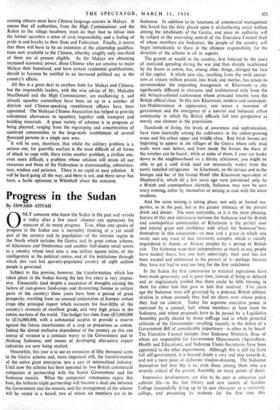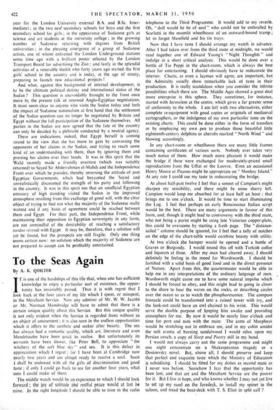Progress in the Sudan
By EDWARD ATIYAH
0 NLY someone who knew the Sudan in the past and revisits it today after a few years' absence can appreciate the measure of its recent progress. True, when one speaks of progress in the Sudan one is inevitably thinking of a yet small part of the country -and its population—of the riverain region in the North which includes the Gezira and its great cotton scheme, of Khartoum and Omdurman and another half-dozen small towns in a country whose total- area is one million square miles, of the intelligentsia at the political centre, and of the institutions through which this vast but sparsely-populated country of eight million people is governed.
Subject to this proviso, however, the transformation which has taken place in the Sudan during the last five years is very impres- sive. Financially (and despite a succession of droughts causing the failure of rain-grown food-crops and threatening famine in certain parts of the country) these years have been a period of great prosperity, resulting from an unusual conjunction of bumper cotton crops (the principal export which accounts for four-fifths of the country's revenue) of excellent grade, and very high prices in the cotton markets of the world. The budget has risen from £E5,000,000 to £E16,000,000, with a substantial surplus to provide a reserve against the future uncertainties of a crop so precarious as cotton. Indeed the almost exclusive dependence of 'the country on this one source of revenue is a constant worry to the Government and to thinking Sudanese, and means of developing alternative export industries are now being studied.
Meanwhile, this year is to see an extension of fifty thousand acres to the Gezira scheme and, more important still, the transformation of the entire giant enterprise into a sort of nationalised industry. Until now the scheme has been operated by two British commercial companies in partnership with the Sudan Government and the Sudanese tenants. When the companies' concessions expire this June, the hitherto triple partnership will become a dual one between the Government and the tenants, and the management of the scheme will be vested in a board, two of whose six members are to be
Sudanese. In addition to its functions of commercial management this-board has the duty placed upon it of furthering social welfare among the inhabitants of the Gezira, and since its authority will be subject to the overriding control of the Executive Council (half of whose members are Sudanese), the people of the country will begin immediately to share in the ultimate responsibility for the direction of the scheme in all its aspects.
The growth of wealth in the country, first fostered by the years of restricted spending during the war and then sharply accelerated by the boom in cotton, has, among other things, changed the face of the capital A whole new city, resulting from the swift conver- sion of sixteen million pounds into brick and mortar, has arisen to accommodate the expanding bourgeoisie of Khartoum—a city significantly different in character and architectural style from the old African-colonial cantonment whose principal tenants were the. British official class! In this new Khartoum, modern and cosmopoli- tan-Mediterranean in appearance, one senses a recession of government and the emergence of a natural and balanced urban community in which the British officials fall into perspective as merely one element in the population.
Standards of living, the levels of awareness and sophistication, have risen markedly among the cultivators in the cotton-growing areas and the urban upper and middle, class. Red brick houses' are beginning to appear in the villages of the Gezira where only mud walls were seen before, and from inside the houses the blare of the wireless can be heard ; while at some of them, if your car broke down in the neighbourhood on a thirsty afternoon, you might be able to get a cold drink (and not necessarily water) from the newly installed refrigerator. In Khartoum, on the terrace and in the lounges and bar of the Grand Hotel (the Khartoum equivalent of Shepheard's), which till a few years ago were patronised only by a British and cosmopolitan clientele, Sudanese may now be seen every evening, either by themselves or mixing at ease with the white residents.
And the same mixing is taking place, not only at formal tea- parties, as in the past, but in the greater intimacy of the private drink and dinner. The most noticeable, as it is the most pleasing, feature of this new intercourse between the Sudanese and the British and cosmopolitan communities of Khartoum is the perfect ease and natural grace and confidence with which the Sudanese– bear themselves in this association—an ease and a grace in which one rarely sees any trace of that inferiority complex which is usually engendered in Asiatic or African peoples by a period of British rule. The Sudanese want their independence as much as any people have wanted theirs, but, one feels admiringly, their soul has not been warped and embittered in the pursuit of it—perhaps because they have not had to wait too long for the first instalment.
In the Sudan the first concessions to national aspirations have been made generously and in good time, instead of being so delayed and so ungraciously yielded that there could be little blessing in them for either him that gave or him that received. Five years ago the Sudanese were still governed by a paternal British admini- stration in whose counsels they had no share, over whose policy they had no control. Today the supreme executive power is exercised by a council, half whose members at least must be Sudanese, and whose proposals have to be passed by a Legislative Assembly partly elected by direct suffrage and in which powerful criticism of the Government—resulting recently in the defeat of a Government Bill of considerable importance--is often to be heard. The Executive Council includes four .Sudanese Ministers, three of whom are responsible for Government Departments (Agriculture, Health and -Education), and Sudanese Under-Secretaries have been appointed to the other departments. Although this is still far from full self-government, it is beyond doubt a very real step towards it, and not a mere piece of elaborate window-dressing. The Sudanese themselves feel that this is so, even those among them who are severely critical of the present Assembly on many points of detail.
Impressive developments are also to be seen in education and cultural life—in the fine library and new hostels of Gordon College (successfully living up to its new character as a university college, and presenting its students for the first time this
year for the London University external B.A. and B.Sc. Inter- mediate) ; in the two nee secondary schools for boys and the first secondary school for girls ; in the appearance of Sudanese girls as science and art students at the university college ; in the growing number of Sudanese returning with degrees from British universities ; in the pleasing emergence of a group of Sudanese artists, one of whom enlivened the London Underground stations some time ago with a brilliant poster selected by the London Transport Board for advertising the Zoo ; and lastly in the splendid activities of a venerable sheikh who-forty years ago started the first girls' school in the country and is today, at the age of ninety, preparing to launch new educational projects And what, against this background of internal development, is to be the ultimate political destiny and international status of the Sudan ? This question is unavoidably brought to the front once more by the present talk of renewed Anglo-Egyptian negotiations. It must seem clear to anyone who visits the Sudan today and feels the impact of Sudanese nationalism at first hand that the settlement of the Sudan question can no longer be negotiated by Britain and Egypt without the full participation of the Sudanese themselves. All parties in the Sudan are now agreed that the fate of the country can only be decided by a plebiscite conducted by a neutral agency.
There are indications, indeed, that Egypt herself is coming round to the view that she has more to gain by canvassing the opponents of her claims in the Sudan, and trying to reach some kind of an understanding with them, than by ignoring them and pressing her claims over their heads. It was in this spirit that the Wafd recently made a friendly overture (which was suitably returned) to Sayed Sir Abderrahman el-Mandi and the Independence Front over which he presides, thereby reversing the attitude of past Egyptian Governments, which had boycotted the Sayed and unrealistically discounted the strength of his party and following in the country. It was in this spirit too that an unofficial Egyptian emissary of high standing visited the Sudan in the improved atmosphere resulting from this exchange of good will, with the clear object of trying to find out what the majority of the Sudanese really wanted and if any basis of agreement could be reached between them and Egypt. For their part, the Independence Front, while maintaining their opposition to Egyptian sovereignty in any form, are not unmindful of the desirability of reaching a satisfactory modus vivendi with Egypt. It may be, therefore, that a solution will yet be found, but the prospects are still fragile. Only one thing seems certain now : no solution which the majority of Sudanese are not prepared to accept can be profitably entertained.







































 Previous page
Previous page